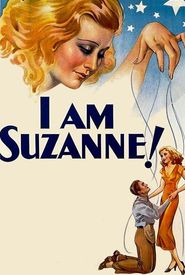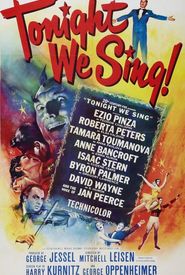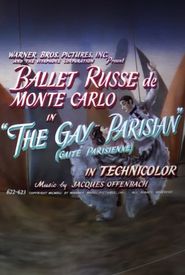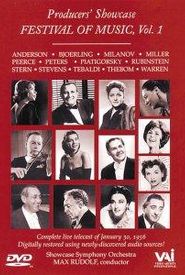Sol Hurok was a visionary impresario whose extraordinary achievements in the realm of arts and entertainment left a lasting impact on the cultural topography of the United States, forever altering the country's artistic landscape. One of his most remarkable and trailblazing accomplishments was his daring endeavour to introduce the illustrious Bolshoi Theatre Ballet to America during the precarious era of the Cuban Missile Crisis, a feat that was all the more astonishing given the strained international relations and the icy grip of Cold War politics that gripped the world at the time.
Sol Hurok's extraordinary diplomacy and artistic acumen allowed him to expertly disentangle the domains of Russian art and culture from the Soviet political apparatus, thereby successfully navigating the ideologically charged landscape of the era.
This remarkable accomplishment not only cleared the path for future cultural exchanges between the Eastern and Western hemispheres, but also solidified Sol Hurok's reputation as a visionary and trailblazing impresario, unwaveringly committed to promoting the timeless, universal language of art and music.
Throughout his illustrious career, Hurok's unshakeable passion for the arts and his unyielding dedication to their dissemination enabled him to bridge the gap between nations, fostering a deeper understanding and appreciation of the world's rich cultural heritage.
As a master impresario, Hurok's unwavering commitment to artistic excellence and his unrelenting pursuit of innovative presentation styles allowed him to transcend the boundaries of time and geography, bringing the world's most talented performers and artists to the forefront of the global stage.
Through his tireless efforts, Hurok not only left an indelible mark on the world of art and culture, but also inspired generations of artists, performers, and patrons, forever changing the landscape of the entertainment industry.
Sol Hurok, a visionary entrepreneur, arrived in the United States in his youth, and through sheer determination and unwavering dedication, he rose to prominence in the entertainment industry.
Throughout his remarkable career, spanning decades, Hurok devoted himself to fostering and celebrating the talents of some of the world's most celebrated artists, including the illustrious pianist Vladimir Horowitz, the renowned pianist Artur Rubinstein, and the legendary choreographer George Balanchine.
Through his tireless efforts, Hurok played a pivotal role in introducing and promoting the works of these artistic giants to a wider audience, cementing his position as a leading figure in the world of entertainment.
Throughout the entirety of his remarkable life, Hurok was propelled by an unwavering passion for the arts, his enthusiasm for the creative endeavors that bring people together and his relentless commitment to sharing the unparalleled beauty and profound richness of cultural heritage with diverse audiences all around the globe.
Sol Hurok's illustrious career has left an indelible mark on the world of art and entertainment, with his remarkable achievements continuing to captivate and inspire a wide range of individuals, from artists and performers to cultural aficionados and enthusiasts. His tireless efforts to promote and celebrate the beauty and diversity of the human experience have resulted in a lasting legacy that transcends borders, bridges cultural divides, and brings people together in a shared celebration of the universal language of art.
Solomon Israilevich Gurkov, later renowned as Sol Hurok, entered the world on April 9, 1888, in the charming town of Pogar, nestled comfortably near the city of Kharkov, which is now proudly known as Kharkiv, Ukraine. As the third son in a traditional Russian-Jewish family, he was born into a household where his father, Israil Gurkov, was a successful retail trader, successfully running his own business and providing a stable foundation for his family. From a young age, Hurok developed a profound passion for the balalaika, a traditional Russian stringed instrument, and, despite being self-taught, he honed his skills to become a proficient player. In addition to his impressive musical talents, Hurok also worked alongside his father in the family business, acquiring valuable experience and skills that would serve him well in the years to come, laying the groundwork for his future endeavors.
At the tender age of eighteen, Hurok made the bold and audacious decision to leave behind the familiarity of his family and homeland, opting instead to embark on a thrilling new adventure in the United States of America.
In May of the year nineteen hundred and six, Hurok set out on this life-changing journey, accompanied by his devoted and loving girlfriend, Tamara Shapiro, who shared in his aspirations and ambitions.
With a sense of determination and purpose, Hurok utilized every last penny of his hard-earned savings to fund their passage, a sacrifice that would ultimately prove to be a wise and necessary investment in his future.
This marked the beginning of a new and exciting chapter in Hurok's life, one that would be filled with a multitude of challenges, opportunities, and ultimately, great triumph and success.
In the year 1908, a pivotal moment occurred in the life of a notable figure, characterized by the solemnization of a sacred bond between two individuals, thus establishing a lifelong commitment to one another within the hallowed institution of matrimony.
As the newlywed couple embarked on their journey together, they were soon blessed with the arrival of a beautiful and precious daughter, whose presence brought immense joy and fulfillment to the family unit.
The individual, who would later become renowned as Sol Hurok, embarked upon a remarkable odyssey of linguistic assimilation upon migrating to the United States, where he successfully acquired proficiency in the English language, thereby augmenting his existing linguistic repertoire, which already included his native Russian and Yiddish dialects.
Sol Hurok's journey to becoming the most renowned impresario of his time was preceded by a diverse array of unconventional occupations that showcased his adaptability and resourcefulness. Initially, he pursued a career as a peddler, traveling from place to place to sell essential goods to those in need, honing his ability to connect with people from all walks of life.
Subsequently, Hurok transitioned into the role of a streetcar conductor, where he developed a keen sense of navigation and logistical expertise, expertly managing the flow of passengers and ensuring a seamless experience for all. His experience in this position not only refined his organizational skills but also granted him a unique perspective on the intricacies of public transportation.
In another unexpected turn, Hurok took on the role of a bottle-washer, where he demonstrated an unwavering commitment to cleanliness and attention to detail. This unorthodox occupation not only polished his work ethic but also instilled in him a sense of pride in his ability to tackle even the most mundane tasks with dedication and enthusiasm.
Furthermore, Hurok's entrepreneurial spirit led him to explore the world of hardware sales, where he leveraged his exceptional communication skills to effectively market and sell a wide range of products to the public. This experience not only honed his ability to connect with people from diverse backgrounds but also granted him a deeper understanding of the importance of building strong relationships with clients.
These early experiences, though unconventional, laid the foundation for Hurok's eventual rise to prominence as a renowned impresario, where he would go on to shape the entertainment industry with his innovative spirit and unwavering dedication.
Sol Hurok's unwavering commitment to his adopted homeland reached a pivotal moment in 1914, as he officially acquired American citizenship through the naturalization process. This milestone event served as a transformative catalyst in his life, marking the beginning of a new chapter as he embarked on a journey to forge a unique identity for himself within the fabric of his adopted country.
Sol Hurok, a pioneering show promoter, left an indelible mark on the entertainment industry by launching the trailblazing concert series "Music for the Masses" in 1913, a groundbreaking initiative that would go on to shape the landscape of the industry for decades to come.
Throughout his illustrious career, which spanned an astonishing four thousand artists and companies, Hurok demonstrated a singular focus on the Russian artistic elite, showcasing the talents of Russia's most celebrated musicians, opera singers, and ballet dancers.
His dedication to promoting the works of these Russian artists was unwavering, and his tireless efforts helped to introduce their unique cultural heritage to audiences around the world.
Noted impresario Solomon Hurok's esteemed career spanned the representation of a plethora of illustrious Russian artists, whose virtuosity and artistry left an indelible mark on the world of classical music. Among the esteemed roster of musicians under his agency, one finds the celebrated violinist Efrem Zimbalist Sr., whose technical mastery and expressiveness on the instrument earned him widespread acclaim. Additionally, Hurok had the privilege of representing other prominent violinists, including the renowned David Oistrakh and Leonid Kogan, whose performances continue to inspire and awe audiences to this day. Furthermore, his agency was also responsible for the representation of talented Russian pianists, such as the incomparable Viktor Tretyakov, Valeri Klimov, and Mstislav Rostropovich, whose contributions to the world of classical music are nothing short of monumental.
As a prominent figure in the world of opera, Hurok had the esteemed privilege of representing a distinguished array of Russian opera singers, including the legendary and revered Feodor Chaliapin Sr., whose remarkable talent and artistry left an indelible mark on the opera world. His roster also boasted the renowned and celebrated Yelena Obraztsova, whose powerful voice and captivating stage presence left audiences in awe, as well as the celebrated and accomplished Irina Arkhipova, Galina Vishnevskaya, and Zara Dolukhanova, each of whom made significant contributions to the world of opera and opera singing.
In addition to his impressive roster of opera singers, Hurok also had the pleasure of representing talented ballet dancers who were pioneers in their field, including the renowned and influential Mikhail Fokin, whose groundbreaking choreography and innovative approach to ballet left a lasting impact on the art form. His roster also included the legendary and iconic Anna Pavlova, whose breathtaking beauty, captivating stage presence, and technical mastery of ballet left audiences around the world in awe. Additionally, Hurok represented the trailblazing and innovative Isadora Duncan, whose bold and daring approach to dance challenged traditional norms and paved the way for future generations of dancers. Finally, his roster included the celebrated and accomplished Galina Ulanova, whose technical mastery, captivating stage presence, and deep understanding of the art form made her one of the most beloved and respected ballet dancers of her time.
Notable among Hurok's impressive repertoire of clients was the esteemed pianist Artur Rubinstein, whose legendary status as a virtuoso was matched only by his dedication to his craft. Hurok also had the privilege of representing the illustrious Svyatoslav Richter, a pianist renowned for his technical mastery and interpretive depth. Additionally, Hurok played a pivotal role in promoting the work of Emil Gilels, a pianist celebrated for his lyricism and tonal beauty. Furthermore, Hurok's efforts were instrumental in introducing American pianist Van Cliburn to Russian audiences, a groundbreaking moment in the cultural exchange between the two nations that had far-reaching implications for the world of classical music.
In the year 1935, a defining moment in the illustrious career of the celebrated impresario Sol Hurok occurred in the City of Light, the picturesque and culturally rich city of Paris, France, where he was fortunate enough to be introduced to the extraordinary vocalist Marian Anderson, a gifted singer renowned for her powerful and emotive voice, by the illustrious pianist Arthur Rubinstein, a maestro widely recognized for his exceptional talent and contributions to the world of classical music.
Throughout that pivotal period in American cultural history, the esteemed concert halls of the nation, unfortunately, persisted in their refusal to provide a platform for black performers, perpetuating a discriminatory practice that was deeply ingrained and seemingly intractable.
On the ninth day of April, in the year nineteen thirty-nine, Sol Hurok masterminded an unparalleled outdoor performance, which took place at the hallowed Lincoln Memorial, a revered and historic landmark. This remarkable event drew a staggering multitude of seventy-five thousand individuals, who gathered to bear witness to the extraordinary talents of the incomparable Marian Anderson.
As the renowned vocalist took to the stage, her sublime rendition of her repertoire sent shivers down the spines of the mesmerized audience, instantly catapulting her to the pinnacle of fame and catapulting her into the stratosphere of celebrity status. The sheer brilliance of her performance left an indelible mark on the hearts and minds of those in attendance, and as a direct result, she was honored with an invitation to the esteemed White House.
It was at this iconic residence that Marian Anderson was graciously received by the First Lady of the United States, the incomparable Eleanor Roosevelt. This remarkable encounter marked a momentous occasion in the life of the legendary vocalist, as she basked in the warmth and admiration of her newfound fame, while simultaneously being welcomed into the inner circle of American politics.
Sol Hurok, a trailblazing figure in the realm of global entertainment, embarked on a remarkable career that spanned numerous decades, leaving an indelible mark on the industry.
From the 1930s to the 1950s, Sol Hurok's unwavering dedication and perseverance enabled the United States to host an astonishing variety of esteemed theatrical troupes from the European continent, the vast expanse of Russia, and the culturally rich nation of Israel.
One remarkable episode in the illustrious career of Sol Hurok, the renowned impresario, stood out as a testament to his unwavering dedication to his artistic principles and his refusal to compromise his values, even in the face of overwhelming temptation and persuasion from a powerful figure. It was none other than Joseph Stalin, the Soviet leader, who made a personal appeal to Hurok, requesting that he use his considerable influence to persuade the celebrated Russian bass, Feodor Chaliapin, to return to his homeland.
Stalin's offer was nothing short of extraordinary, promising lavish financial rewards and unparalleled glory to numerous famous Russian émigrés if they would only return to their native land. However, Hurok's response was a resolute and unwavering "No", a decision that demonstrated his unshakeable commitment to his artistic vision and his refusal to be swayed by the lure of wealth and prestige.
This remarkable episode in Hurok's career serves as a testament to his integrity, his artistic passion, and his refusal to compromise his values, even in the face of overwhelming pressure and temptation. It is a shining example of his unwavering dedication to the art of music and his unshakeable commitment to his own artistic vision.
Sol Hurok's remarkable career was marked by numerous such instances of his unwavering commitment to his artistic principles, his refusal to compromise his values, and his unshakeable dedication to the art of music. Despite the many challenges and obstacles he faced, Hurok remained true to his artistic vision, and his legacy continues to inspire and influence generations of musicians and music lovers around the world.
Born in 1888 in Baku, Azerbaijan, Sol Hurok was a Russian émigré who made a name for himself in the world of opera and classical music. He was a talented musician and a skilled businessman, and he quickly established himself as one of the leading impresarios of his time. Throughout his long and illustrious career, Hurok was known for his unwavering dedication to his artistic vision, his refusal to compromise his values, and his unshakeable commitment to the art of music.
Hurok's remarkable career was marked by numerous notable achievements and milestones. He was responsible for introducing many famous Russian artists to the Western world, including Feodor Chaliapin, Sergei Rachmaninoff, and Vladimir Horowitz. He was also instrumental in establishing the Metropolitan Opera in New York City, and he played a key role in the development of the New York City Opera.
Despite his many achievements and accomplishments, Hurok remained humble and unassuming, and he continued to work tirelessly behind the scenes to promote the art of music. He was a true artist at heart, and his love for music was his greatest inspiration and motivation. Throughout his life, Hurok was known for his kindness, his generosity, and his unwavering dedication to his artistic vision.
Sol Hurok's remarkable legacy continues to inspire and influence generations of musicians and music lovers around the world. He was a true artist, a talented musician, and a skilled businessman, and his unwavering commitment to his artistic vision and his refusal to compromise his values are a testament to his enduring legacy.
In the year 1946, Hurok embarked on a literary endeavour, taking the first step towards leaving a lasting legacy through the publication of his memoir, which bore the title 'Impresario'. This autobiographical work offered readers a unique and intimate glimpse into the life and career of a prominent impresario, providing a window into the world of the arts and the many experiences that had shaped his life.
Hurok's remarkable accomplishments during the 1960s were characterized by meticulously planned international tours of the esteemed Bolshoi Theatre, renowned for its grand-scale Russian operas and ballets, showcasing the company's extraordinary talent and artistry to a global audience. Following this success, he orchestrated numerous international excursions for the Kirov Ballet of Leningrad, now St. Petersburg, Russia, further solidifying his reputation as a masterful producer of international cultural events. His impressive resume also includes the organization of multiple tours to the United States for the Moscow Art Theatre and the 'Beriozka' ensemble, demonstrating his ability to bridge cultural divides and bring world-class Russian art and entertainment to American audiences.
Notably, Hurok achieved the seemingly insurmountable feat of bringing the Bolshoi Theatre Ballet to America during the tumultuous Cuban Missile crisis, a period marked by heightened political tensions and international uncertainty. By doing so, he successfully dissociated Russian art and culture from the prevailing Soviet politics of the era, highlighting the power of art to transcend political boundaries and foster greater understanding between nations.
Sol Hurok, a towering figure in the realm of entertainment, was confronted with a harrowing ordeal in 1972 when a bomb detonated in his office, resulting in the tragic loss of one of his staff receptionists and leaving several others gravely injured. Against all odds, Hurok miraculously emerged from the devastating incident unscathed, and his unwavering dedication to fostering Russian-American cultural exchange projects remained unbroken. One of his most notable and ambitious undertakings was a groundbreaking collaboration with the illustrious ballet dancer Rudolf Nureyev, a partnership that was made possible through the generous patronage of the prominent businessman and philanthropist David Rockefeller.
Sol Hurok's illustrious career was cruelly curtailed when he succumbed to a fatal heart attack on March 5, 1974, as he was en route to a highly anticipated meeting with the esteemed David Rockefeller in the bustling city of New York.
The outpouring of sorrow and admiration for the illustrious impresario was nothing short of overwhelming as thousands of people, including numerous internationally acclaimed performers, converged upon the iconic Carnegie Hall to pay their respects at his memorial service.
The somber occasion was a testament to the profound impact Sol Hurok had on the world of the performing arts, his legacy continuing to inspire and influence generations of artists, musicians, and theater enthusiasts to this day.






















